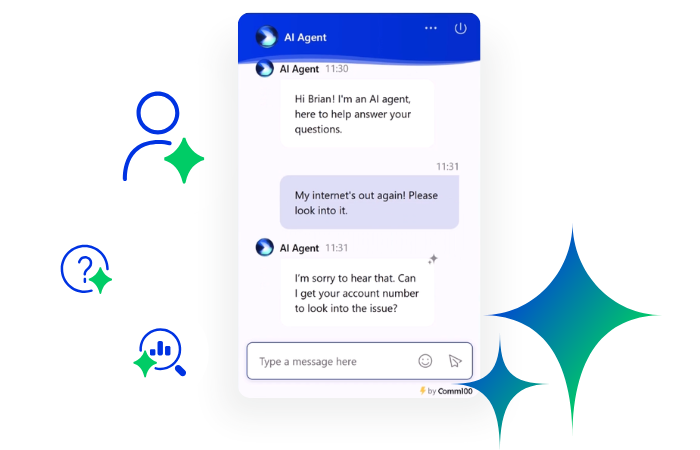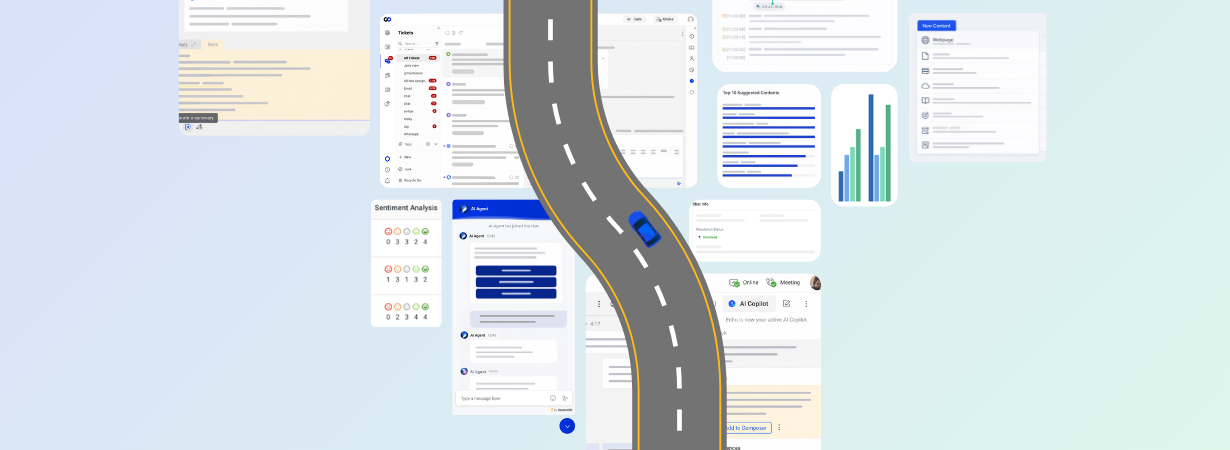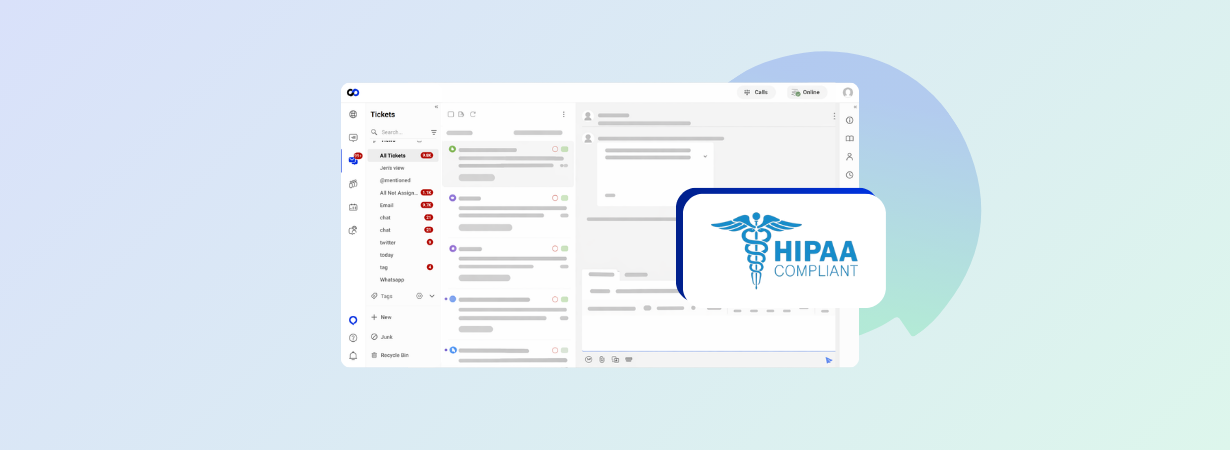Zendesk remains a dominant force in customer service software, but its complexity and premium pricing structure drive many businesses to explore alternatives. Whether you’re looking for more affordable options, specialized features, or simpler interfaces, the market offers compelling choices that might better suit your needs.
Finding the right customer service platform depends on your company’s size, budget, technical requirements, and customer communication channels. Some businesses need AI-powered automation to handle high volumes, while others prioritize straightforward email management.
The 8 Best Alternatives to Zendesk in 2026
In the following paragraphs, we are going to look at eight Zendesk alternatives that deliver strong customer service capabilities across different business contexts.
| | | | |
| Organizations needing omnichannel and advanced AI with compliance (gaming, healthcare, higher education, finance, telecommunications) | Full AI ecosystem (AI Agent, AI Copilot, AI Insights, AI Knowledge, AI QA, AI Onboarding). Strong compliance. Scalable. Transparent pricing. Robust onboarding. | Limited agent console customization. Reporting could improve. | |
| Small e-commerce businesses and startups | Easy setup. Shopify-friendly. Visual chatbot builder. Conversation-based pricing. | Can become expensive with add-ons. Limited reporting and customization. Real costs often 2–3x advertised. | |
| Large enterprises using Salesforce ecosystem | Very large feature set. Powerful automation. Deep Salesforce integrations. Highly customizable. | Steep learning curve. Expensive. Slow customer support. | |
| Enterprise and regulated industries needing advanced conversational AI | Strong NLP. Robust analytics. Enterprise-grade security. | Very high cost. Complex setup. Unintuitive interface. Inconsistent bot responses. | |
| SaaS and product-led growth companies needing in-app messaging and onboarding tools | Great UX. Strong personalization. Chat, email, and in-app messaging together. | AI is weaker than competitors. Customization limits. Extra charges for Fin AI resolutions. Slow support. | |
| Companies prioritizing automation and self-service | No-code builder. Strong NLP. Good for repetitive queries. Supports 40+ languages. | No public pricing. Limited transparency. Must contact sales. Unknown limitations. | |
| Small and mid-sized businesses focused on email support | Simple shared inbox. Very intuitive. Fast setup. Excellent support. Clean reporting. | Weak multi-brand support. Only one KB template. Extra cost for additional knowledge bases. | |
| Mid-market and enterprise e-commerce companies with high support volume | Unified customer timeline. Deep commerce integrations. Strong automation. Multilingual AI assistant. | No free trial. Custom pricing. Complex for smaller teams. | |
1. Comm100
Comm100 is an omnichannel customer engagement platform that combines live chat, email, ticketing, messaging, AI agents, and AI copilot features to help businesses deliver personalized support across multiple channels. It’s the ultimate solution for organizations that want to create an AI-powered customer experience ecosystem.
The platform automates up to 80% of customer queries with context-aware, AI-driven responses and deploys in minutes across live chat, SMS, email, and major messaging apps. It’s one of the best customer service software suites, covering AI, live chat, and more.
Here’s a short overview of Comm100’s AI solutions:
- AI Live Chat: Intelligent chat system that combines human agents with AI assistance to provide real-time customer support across websites and messaging platforms.
- AI Agent: Conversational AI that handles complete customer interactions from initial inquiry to resolution without human intervention, escalating complex cases when needed.
- AI Copilot: Real-time AI assistant that provides human agents with suggested responses, instant policy lookups, and contextual information to improve response quality and reduce handle times.
- AI Insights: Advanced analytics platform that analyzes customer conversations to identify trends, sentiment patterns, and performance metrics for data-driven customer service optimization.
- AI Knowledge: Smart self-service portal powered by AI that automatically suggests relevant articles to customers and continuously learns from interactions to improve response accuracy.
- AI Quality Assurance: Provides automated scoring and evaluation of advisor interactions using your institution’s guidelines and knowledge base as benchmarks. The system reviews conversations at scale, explains scoring rationale, and creates structured coaching opportunities directly from review findings.
- AI Onboarding: Accelerates new advisor training through AI-generated interactive scenarios and knowledge assessments, creating realistic practice conversations, offering adaptive learning based on responses, and grading knowledge base questions.
Pros
- Comprehensive training resources and extensive onboarding support ensure teams can maximize platform capabilities
- Pre-built integrations with platforms like Salesforce and robust API support for custom integrations
- Meets SOC 2, PCI DSS, HIPAA, and GDPR compliance standards with support for 90+ languages
- Scales effectively from small startups to large enterprises without compromising service quality
- Transparent pricing
- Visual workflow builder for the Comm100 AI Agent
Cons
- Limited customization options for the agent console
- Reporting capabilities could be enhanced
Free Trial: Yes, available without credit card requirement
Best for: Businesses looking to use AI to optimize CX, including those with strong compliance requirements, particularly in regulated industries like gaming, healthcare, and higher education.
2. Tidio
Tidio is a customer communication platform that brings together live chat, AI chatbots, and multichannel messaging to help e-commerce businesses interact with website visitors more efficiently.
The platform is especially known for its user-friendly interface, making it easy to set up and use without technical skills. However, if you’re looking for advanced features like AI knowledge management, it might not be your top pick.
Pros
- Integrates smoothly with platforms like Shopify, WordPress, and Zapier, making it popular among e-commerce stores
- AI-powered chatbot with visual builder that simplifies setup for non-coders
- Conversation-based pricing rather than ticket-based, potentially more cost-effective for many teams
Cons
- Users report that paid plans can become expensive quickly, particularly when adding premium features and additional users
- Some mention occasional limitations in integrations, reporting capabilities, and customization options
- Real-world costs typically run 2-3x higher than advertised prices once add-ons and chat volume are factored in
Free Trial: Yes, 7-day free trial of all features without credit card requirement
Best for: Small e-commerce businesses and startups looking for an affordable entry point into live chat and basic chatbot automation.
3. Salesforce Service Cloud
Salesforce Service Cloud is a comprehensive customer service management solution that streamlines support operations for businesses of all sizes, offering tools for managing inquiries, tracking cases, and providing personalized support across multiple channels.
It centralizes and optimizes agent efforts while enabling support mobility from anywhere. It’s also a household name, and while it may not be ideal for smaller businesses, many enterprise businesses prefer using Salesforce Service Cloud simply because they’re already using other Salesforce products.
Note: Comm100 offers a dedicated integration for Salesforce.
Pros
- Comprehensive suite of tools with powerful automation features like workflows and AI-driven recommendations that significantly improve response times
- Seamlessly integrates with other Salesforce products and third-party applications
- Thousands of built-in features and third-party app integrations provide unmatched functionality
- Highly customizable platform adapts to various business needs and scales to accommodate organizational growth
Cons
- Complexity requires a steep learning curve, especially for new users, with customizations sometimes requiring advanced technical knowledge
- Cost can be prohibitive for small to mid-market organizations, with many hidden expenses and development costs making it far more expensive than initially anticipated
- Many users report difficulty reaching customer support, with slow response times and inconsistent quality of assistance
Free Trial: Yes, 30-day free trial available without credit card
Best for: Large enterprises with existing Salesforce CRM implementations and complex support requirements across multiple departments.
4. LivePerson
LivePerson is an AI-driven conversational platform that empowers businesses to engage with customers through messaging channels. LivePerson markets its Conversational Cloud platform, which orchestrates customer interactions across SMS, WhatsApp, Facebook Messenger, web chat, and voice channels from a unified interface.
Like Comm100, LivePerson also offers AI agents and sentiment analysis capabilities. However, this might not be the best choice for small to mid-sized businesses that are looking to expand into customer service, primarily because pricing can rapidly get out of hand with advanced features.
Pros
- Advanced AI and natural language processing enable accurate and efficient customer support across multiple communication channels
- Real-time analytics and reporting tools monitor conversation performance and provide insights into customer behavior and agent performance
- Built for large, highly regulated, consumer-facing enterprises with robust security and compliance features
Cons
- High cost structure is typically more suited to large enterprises and can be prohibitively expensive for smaller businesses with limited budgets
- Some users report the platform can be complex to set up for new users, with an unintuitive interface that’s challenging for beginners
- Limited customization options beyond basic setups often require developer assistance, creating barriers for businesses looking to quickly implement changes
- AI chatbot responses can be inconsistent and sometimes irrelevant
Free Trial: No free trial currently offered
Best for: Enterprise companies in highly regulated industries that need sophisticated AI-powered customer service with advanced conversational capabilities.
5. Intercom
Intercom combines live chat, email, and in-app messaging with a particular strength in guiding users through product onboarding and feature adoption.
Companies use it to send targeted messages based on user behavior; things like feature announcements to power users or activation prompts to trial accounts showing low engagement.
The platform’s approach differs from traditional help desks. Rather than organizing everything around tickets, Intercom structures conversations around customer profiles that accumulate interaction history across sales, marketing, and support touchpoints. This works well for SaaS companies where the line between customer success and technical support blurs frequently.
Intercom’s Fin AI chatbot draws from your help center articles to answer common questions, though it charges per resolution on top of base subscription costs. The automation capabilities lean toward marketing-style campaigns and triggered messages rather than complex workflow orchestration.
Pros
- User-friendly interface designed with ease of navigation in mind, allowing teams to get up and running quickly without a steep learning curve
- Wide range of features from live chat to email marketing all in one platform, making it versatile for streamlining customer communication
- Strong ability to personalize customer interactions, automate processes through chatbots, and integrate seamlessly with existing systems
Cons
- AI capabilities are not as advanced as some competitors, which may be a drawback for businesses seeking sophisticated AI-driven interactions
- Limited customization options may not be flexible enough to tailor to specific branding requirements or workflows
- Each resolution with Fin AI costs $0.99, so 500 resolutions per month (minimum 50 required) adds $495 to monthly bill on top of base subscription
- Some users complain about slow response times from Intercom’s own customer support team
Free Trial: Yes, 14-day free trial available
Best for: SaaS companies that need in-app messaging and user onboarding capabilities alongside customer support.
6. Ada
Ada focuses almost exclusively on automation. The platform’s entire premise is reducing human agent involvement by building AI chatbots that handle customer inquiries independently across channels. No split focus between marketing automation and support; just self-service at scale.
The no-code builder lets non-technical teams create conversational flows through drag-and-drop interfaces. You connect Ada to your knowledge base, configure conversation paths, and deploy across web chat, SMS, or messaging apps.
The system supports over 40 languages, making it viable for companies with global customer bases who want consistent automated support regardless of geography.
Ada’s natural language processing interprets customer questions and matches them against your content library to generate responses. When queries exceed the bot’s capabilities, it can escalate to human agents, though the platform positions itself as minimizing these handoffs. Companies typically deploy Ada when they’ve identified high-volume, repetitive inquiry patterns that consume agent time without requiring human judgment.
Pros
- No-code chatbot builder with simple drag-and-drop interface allows creation and customization without coding requirements
- Advanced natural language processing delivers accurate and contextually relevant responses to customer queries
- Intuitive interface enables teams to create, test, and deploy chatbots and automate workflows efficiently
Cons
- Custom pricing based on business needs with no publicly available pricing information
- Limited information available about platform limitations and potential drawbacks
- Requires contacting sales team for a demo or personalized pricing quotes, adding friction to evaluation process
Free Trial: Information not publicly available
Best for: Companies looking to maximize self-service support and reduce agent workload through extensive automation.
7. Help Scout
The Help Scout platform deliberately avoids feature bloat, focusing instead on what small to mid-sized teams actually need for email-based customer support. You get a shared inbox that feels like Gmail but functions as a proper help desk; tickets, assignments, collision detection, and automation without the enterprise complexity.
The interface is intuitive and simple, which sharply reduces ramp-up times. The learning curve is essentially flat, which matters when you’re bringing on seasonal support staff or have high turnover.
Built-in knowledge base tools let customers help themselves, though you’re limited to one knowledge base per subscription regardless of how many brands or product lines you manage.
Pros
- Excellent customer service
- Intuitive out-of-the-box platform that works right away without complex setup requirements
- Advanced reporting, customer profiles, and integrations with popular tools like Slack, HubSpot, and Salesforce make it flexible enough for broader customer operations
- 15-day free trial of Standard or Plus plans without credit card requirement
Cons
- Struggles with multi-team, multi-brand setups despite being clean and user-friendly
- Multiple knowledge bases per account cost extra.
- Interface, especially inbox UI, has room for improvement with only one knowledge base template design currently available
Free Trial: Yes, 15-day free trial available without credit card for Standard and Plus plans
Best for: Small to mid-sized businesses that prioritize email support and want a simple, elegant interface without unnecessary complexity.
8. Kustomer
Kustomer rebuilt customer service software around a fundamental insight: traditional ticketing systems fragment the customer experience. Instead of treating each inquiry as a separate ticket, Kustomer views all interactions with a customer as part of a single, continuous conversation displayed in a unified timeline.
The company was founded in 2015, acquired by Meta Platforms for $1 billion in 2022, then spun off independently a year later. Today, it uses an open CRM architecture, which serves as a single source of truth for customer data, particularly valuable for retail, food delivery, and e-commerce companies managing high interaction volumes.
The platform targets mid-market to enterprise organizations, particularly e-commerce brands experiencing rapid growth. However, teams seeking straightforward, out-of-the-box simplicity may find the comprehensive feature set overwhelming.
Pros
- Brings in real customer data from Shopify, Stripe, Segment, Salesforce, and displays it alongside conversations without toggling between tabs
- KIQ Agent Assist provides translation capabilities in 53+ languages, summarizes conversations, and transfers summaries between agents for context
- Timeline format displays all customer interactions in threaded chronological view, allowing easy continuation across channels
- Customizable workflow engine designs conditional, automated processes based on events, objects, or tags
Cons
- No free trial offered, requiring commitment before testing platform capabilities
- Custom pricing requires contacting sales team, lacking transparency in costs
- Geared primarily toward enterprise teams, potentially limiting accessibility for smaller businesses
Free Trial: No free trial offered
Best for: E-commerce enterprises that need deep integration with transaction data and customer purchase history to deliver context-rich support experiences.
What is the Best Alternative to Zendesk in 2026?
Comm100 is the best alternative to Zendesk. With dedicated, 24/7 customer support for clients, a transparent pricing structure, and a full suite of AI-first customer support tools, Comm100 stands out as the best Zendesk alternative for organizations that need enterprise-grade capabilities without enterprise-level complexity.
Here’s why:
- Six integrated AI solutions work together seamlessly: AI Agent, AI Copilot, AI Insights, AI Knowledge, AI Quality Assurance, and AI Onboarding
- Automates up to 80% of customer queries with context-aware, human-like responses
- Deploys in minutes across all major messaging platforms, learning instantly from your website, knowledge bases, or cloud files; no coding required
- Meets SOC 2, PCI DSS, HIPAA, GDPR, and WCAG standards
- Training team implements best practices for efficient onboarding and delivers customized training for agents, supervisors, and stakeholders
- Dedicated AI architects, trainers, and customer success managers collaborate to deliver tailored solutions
See Comm100 in Action
See why Comm100 is the best alternative to Zendesk.
View demo
View Demo







